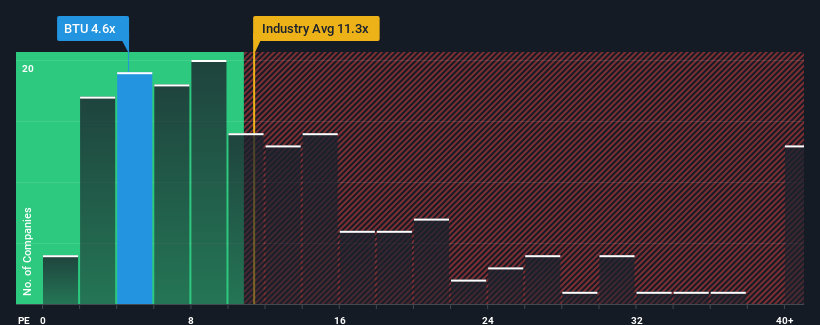- United States
- /
- Oil and Gas
- /
- NYSE:BTU
Peabody Energy Corporation's (NYSE:BTU) Shares Lagging The Market But So Is The Business

When close to half the companies in the United States have price-to-earnings ratios (or "P/E's") above 19x, you may consider Peabody Energy Corporation (NYSE:BTU) as a highly attractive investment with its 4.6x P/E ratio. Although, it's not wise to just take the P/E at face value as there may be an explanation why it's so limited.
While the market has experienced earnings growth lately, Peabody Energy's earnings have gone into reverse gear, which is not great. The P/E is probably low because investors think this poor earnings performance isn't going to get any better. If this is the case, then existing shareholders will probably struggle to get excited about the future direction of the share price.
View our latest analysis for Peabody Energy

Is There Any Growth For Peabody Energy?
In order to justify its P/E ratio, Peabody Energy would need to produce anemic growth that's substantially trailing the market.
Retrospectively, the last year delivered a frustrating 50% decrease to the company's bottom line. This has erased any of its gains during the last three years, with practically no change in EPS being achieved in total. Therefore, it's fair to say that earnings growth has been inconsistent recently for the company.
Turning to the outlook, the next year should bring diminished returns, with earnings decreasing 36% as estimated by the four analysts watching the company. Meanwhile, the broader market is forecast to expand by 15%, which paints a poor picture.
In light of this, it's understandable that Peabody Energy's P/E would sit below the majority of other companies. Nonetheless, there's no guarantee the P/E has reached a floor yet with earnings going in reverse. There's potential for the P/E to fall to even lower levels if the company doesn't improve its profitability.
The Final Word
Using the price-to-earnings ratio alone to determine if you should sell your stock isn't sensible, however it can be a practical guide to the company's future prospects.
As we suspected, our examination of Peabody Energy's analyst forecasts revealed that its outlook for shrinking earnings is contributing to its low P/E. At this stage investors feel the potential for an improvement in earnings isn't great enough to justify a higher P/E ratio. Unless these conditions improve, they will continue to form a barrier for the share price around these levels.
We don't want to rain on the parade too much, but we did also find 5 warning signs for Peabody Energy (1 is concerning!) that you need to be mindful of.
You might be able to find a better investment than Peabody Energy. If you want a selection of possible candidates, check out this free list of interesting companies that trade on a low P/E (but have proven they can grow earnings).
New: Manage All Your Stock Portfolios in One Place
We've created the ultimate portfolio companion for stock investors, and it's free.
• Connect an unlimited number of Portfolios and see your total in one currency
• Be alerted to new Warning Signs or Risks via email or mobile
• Track the Fair Value of your stocks
Have feedback on this article? Concerned about the content? Get in touch with us directly. Alternatively, email editorial-team (at) simplywallst.com.
This article by Simply Wall St is general in nature. We provide commentary based on historical data and analyst forecasts only using an unbiased methodology and our articles are not intended to be financial advice. It does not constitute a recommendation to buy or sell any stock, and does not take account of your objectives, or your financial situation. We aim to bring you long-term focused analysis driven by fundamental data. Note that our analysis may not factor in the latest price-sensitive company announcements or qualitative material. Simply Wall St has no position in any stocks mentioned.
About NYSE:BTU
Peabody Energy
Engages in coal mining business in the United States, Japan, Taiwan, Australia, India, Brazil, Belgium, Chile, France, Indonesia, China, Vietnam, South Korea, Germany, and internationally.
Very undervalued with flawless balance sheet.
Similar Companies
Market Insights
Community Narratives



